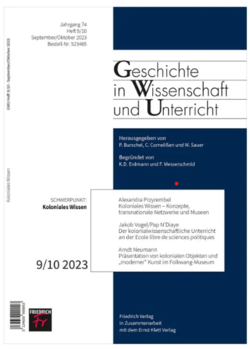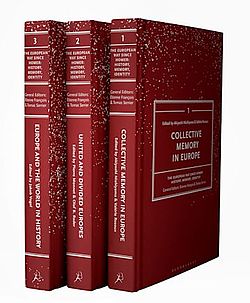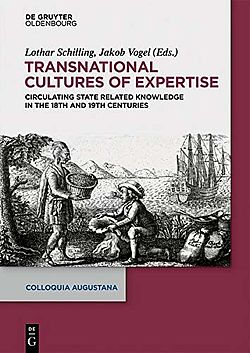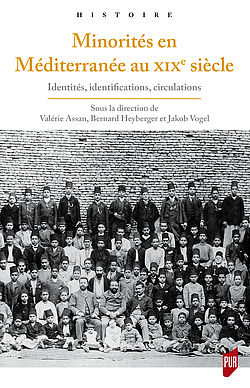Prof. Dr. Jakob Vogel | Associated Researcher

Position
:
since april 2011: Sciences Po Paris (Centre d'Histoire/Dép. d'Histoire), Professeur de l'Histoire de l'Europe (XIXe-XXe siècles)
|
Disciplines
:
History
|
Biography
Prof. Dr. Jakob Vogel | Director
Jakob Vogel served as director of the Centre Marc Bloch from September 2018 to August 2023.
After a commercial apprenticeship in a publishing house, his studies in Bonn and Paris, and a Master's degree in History from Université Paris VII, he defended his thesis at the Frei Universität in Berlin (FU) in 1995. His topic was the “National Military Cult in Germany and France between 1871 and 1914.” In 2000, he became Senior Lecturer (Wissenschaftlicher Assistent) at the Centre for French Studies at the Technische Universität in Berlin (TU), where he obtained his accreditation to supervise research in 2005. This resulted in a book published in 2008 under the title: Ein schillerndes Kristall. Eine Wissensgeschichte des Salzes zwischen Früher Neuzeit und Moderne (Cologne 2008). “H-Soz-Kult,” the communication and information platform for historians, commended this study in 2009. Between 2006 and 2008, Jakob Vogel held the position of Deputy Director at the Centre Marc Bloch before being appointed Professor of 20th Century History of Europe and European Colonialism at the University of Cologne. He joined Sciences Po in Paris in 2011 as “Professor of History of Europe 19th-20th centuries” where he since been teaching, inter alia, as part of the Franco-German program of the Nancy campus, and within the Euro-Africa program of the Reims campus.
In his research and publications, Jakob Vogel has devoted himself to studying issues related to contemporary European history and European colonialism. As a specialist in the history of the “long nineteenth century,” he has conceptualized the role of the nation, national and transnational relations, as well as infra- and extra-European interdependencies. Jakob Vogel participated in establishing and developing the dynamic field of “History of Knowledge” (Wissensgeschichte), a discipline concerned with the shifting role of knowledge in contemporary societies. Recently, one of this field’s priority objectives has been the circulation of both ideas and academic experts in the European and colonial framework, throughout Africa and in Latin America.
---
The European Way since Homer: History, Memory, Identity
Edition: Bloomsbury Academic
Collection: The European Way since Homer: History, Memory, Identity
ISBN: 9781350058552
Bringing together leading scholars from across Europe, as well as the United States, Africa and Asia, The European Way since Homer is a three-volume journey through the political, cultural, religious, intellectual, social and geographical history of Europe. It synthesises over 150 chapters on topics from across the spectrum of people, places, ideas, art, objects and events that have influenced the shaping of the continent. In turn, this rich tapestry provides us with unique insights into the nature of European identity, the importance of European heritage and the relationship that exists between Europe and the world beyond its boundaries.
Volume 3 investigates the different links between Europe and the rest of the world. There is a focus on Europe's imperial past, as well as the subsequent soft power of Europe and its constant commercial and cultural exchanges with others parts of the world.
https://www.bloomsbury.com/uk/european-way-since-homer-history-memory-identity-9781350058668/
Transnational Cultures of Expertise: Circulating State-Related Knowledge in the 18th and 19th centuries (Colloquia Augustana, Band 36)
September 30, 2019Jakob Vogel , Lothar Schilling
Building on the new critical historiography about the evolution of the European state, the book analyses how administrators, scientists, popular publicists and other actors tried to redefine the realms of state action in the "Sattelzeit" (Koselleck). By focussing on the specific strategies of these actors and on the transnational circulation and dissemination of state related knowledge itself, the contributors of the book highlight the fluidity and the interconnections of the European debate in the crucial period of the development of the modern nationstate and its administration. They study the common European features of the evolution of a new type of statehood built upon multiple circulations and transfers that forged administrative practices in the different fields of state action. Analysing important fields of expertise ranging from agricultural knowledge, mining sciences to anthropological knowledge, which laid the basis for the new "scientific" foundations of administration, the book underlines the necessity of a re-evaluation of the classical approaches to the history of state in the 18th and 19th centuries.
Minorités en Méditerranée au XIXe siècle
March 07, 2019Jakob Vogel , Valérie Assan, Bernard Heyberger
Collection: Histoire
ISBN: 978-2-7535-7592-9
L’actualité politique au Moyen-Orient, en Turquie et au Maghreb attire notre attention sur la question de la place des minorités dans les régions qui bordent la Méditerranée. La notion moderne de minorité a été généralement présentée par l’historiographie comme le résultat des débats des experts internationaux au lendemain de la Première Guerre mondiale. Or, la Méditerranée du xixe siècle constitue un terrain particulièrement fécond pour une analyse des multiples dynamiques de la construction des minorités. Cet ouvrage interroge les modalités de la fixation des identités par les États impériaux et par les minorités elles-mêmes. Il accorde une attention particulière à l’articulation entre les critères religieux, linguistiques, nationaux et territoriaux dans la catégorisation de ces identités collectives et individuelles. Il apporte un éclairage sur la mise en place de nouveaux modes d’administration des minorités, montrant les circulations et les transferts des normes et des pratiques, entre minorités au sein d’un même empire, mais aussi d’un empire à l’autre. Privilégiant l’approche comparatiste, ce livre collectif entend contribuer à une histoire croisée des minorités, en faisant dialoguer les historiographies de l’aire ottomane, des mondes coloniaux et de l’Europe.



